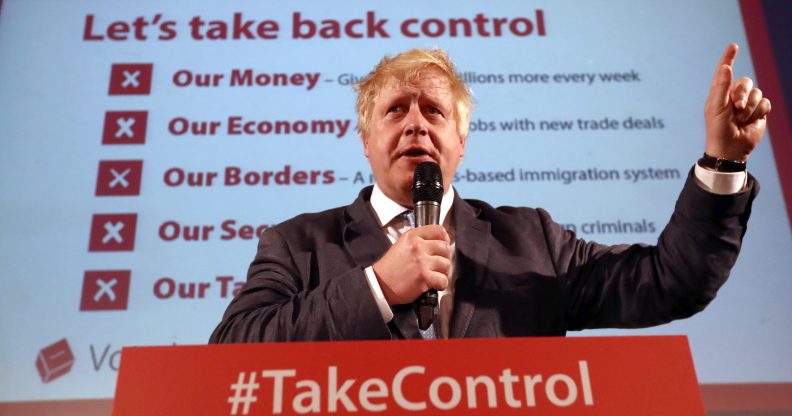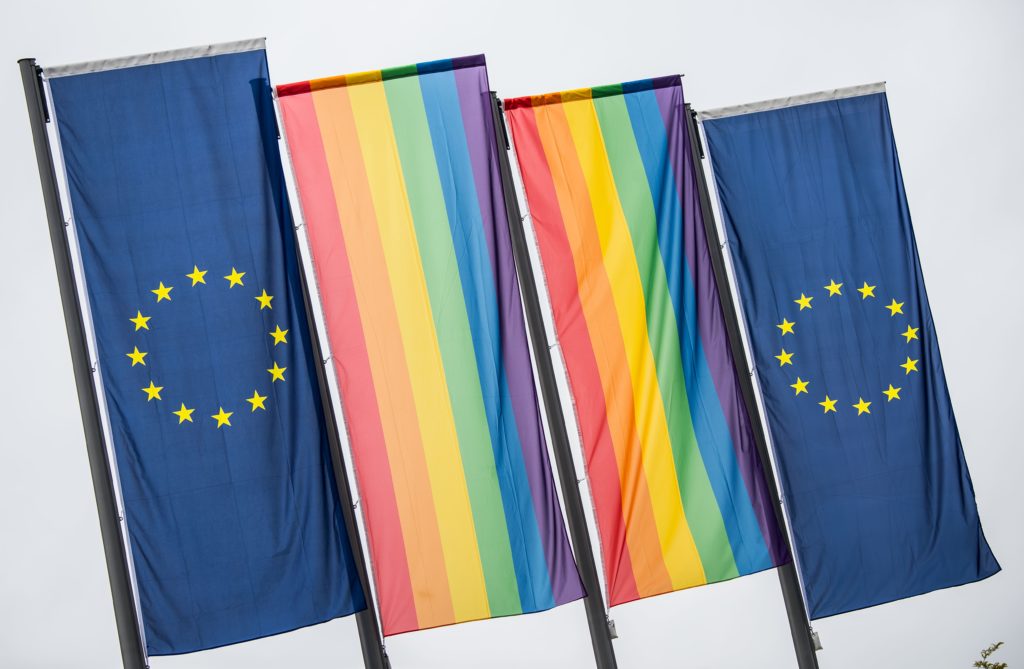This is what LGBT+ rights and laws could look like after the UK crashes out of the European Unio… sorry, Brexit

LONDON, ENGLAND – JUNE 04: Boris Johnson MP talks to supporters during a Vote Leave rally on June 4, 2016 in London, England. Boris Johnson and the Vote Leave campaign are touring the UK in their Brexit Battle Bus. The campaign is hoping to persuade voters to back leaving the European Union in the Referendum on the 23rd June 2016. (Photo by Carl Court/Getty Images)
The University of Law has revealed their prediction for the future of LGBT+ laws and rights in the UK after Brexit, and unfortunately it makes for grim reading.
Rights for the LGBT+ community are expected to be significantly compromised after Britain officially leaves the EU – and with it, the EU’s Charter of Fundamental Rights.
This crucial charter is perhaps the biggest protector of LGBT+ rights in British law as Article 21 outlaws any discrimination on the basis of sexual orientation, as well as race, religion, age and disability.
“This will cease to exist in UK law once Britain leaves the EU, which is a worrying thought,” said Matthew Tomlinson, dean of the Leeds Campus at The University of Law (ULaw).
“Taking away the Charter makes members of the LGBT+ community vulnerable to abuse or discrimination, purely based on their sexual orientation or gender identity.”
Fortunately this change won’t happen overnight, as the transfer of law making from the EU to UK parliament won’t happen until the end of the transition period in 2021.
After this time new UK laws must be put in place to ensure LGBT+ people are legally protected against discrimination – but what form these laws will take, and whether they will encompass trans people, is still unclear.

Thousands of protesters demonstrate against the EU referendum result outside the Houses of Parliament on June 28, 2016 in London. (Jeff J Mitchell/Getty)
“To understand more about what LGBT+ laws will look like after Brexit, we must look at where the majority of them have come from,” Tomlinson continued, noting that the before the 2010 Equality Act, the majority of LGBT+ rights in the UK came from the EU.
“The past has shown that the UK is somewhat behind the rest of Europe when it comes to passing LGBT+ laws. As recently as 1997, there were no laws protecting LGBT+ people in the UK,” he said.
“Although same-sex marriage was legalised in the UK in 2013 and came into force in 2014, this was still many years behind other European countries.
“LGBT+ campaigners in the UK really pushed this legislation to be passed in government, but 172 MPs still voted no. This does raise the question of whether or not same-sex marriage would be legalised by the government on its own, if not pressed by campaigners.”
The fact that many of the UK’s pro-LGBT+ laws only came into force because of the EU raises serious doubts about the post-Brexit future, particularly since much of the Leave campaign hinged upon the so-called “imposition” of laws from Brussels.
With the UK government given free reign to make their own legislation, Tomlinson fears the current laws protecting the community “could sadly be compromised”.

The majority of the UK’s pro-LGBT+ laws came from the EU, which means Brexit could seriously compromise existing protections (ANDREAS ARNOLD/dpa/AFP/Getty)
Particularly concerning is the government’s Brexit Withdrawal Agreement Bill (WAB), which includes a clause that allows British courts to overturn rulings by the European Court of Justice.
In a worst-case scenario this could cause serious problems for the rights of the LGBT+ community as it gives the potential for former cases to be reopened and overturned.
“Additionally, new laws could be passed by the UK government that counteract older laws, such as the Equality Act,” Tomlinson added. “As a new law is a more recent act of parliament, it would take precedence, which could cause more problems for the community.”
He stressed the need for the laws and protections against discrimination to be withheld once Brexit is complete, and for the UK government to guarantee this.
“The government needs to ensure that once this happens, sufficient laws are in place to protect the entire LGBT+ community,” he said.
“I hope the UK government provides clarity to the community on what laws are in place to protect their rights post-Brexit, as this will understandably be a huge worry at this time.”

